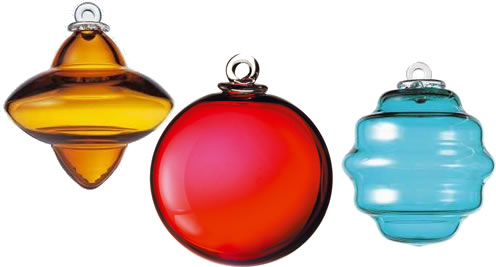Depot:European Triennial of Small Sculpture
Archival article
 European Triennial of Small Sculpture, various designers, Les boules de Noel de Meisenthal: Ligne contemporaine, 2001-2010
European Triennial of Small Sculpture, various designers, Les boules de Noel de Meisenthal: Ligne contemporaine, 2001-2010
Organised by Murska Sobota Gallery, the European Triennial of Small Sculpture Murska Sobota is – beside the Triennial of Small Sculptures Fellbach (near Stuttgart) – the only regular European event featuring the phenomenon of small plastic arts. The very first Biennial of Small Sculpture in Murska Sobota was organised in 1973, initially as a Yugoslav exhibition in the exhibition pavilion of Franc Novak, the forerunner of the Murska Sobota Gallery. The 2010 edition of the European Triennial of Small Sculpture takes place from 10 December 2010 through 24 March 2011.
At each triennial a jury bestows honourable mentions and purchases the award-winning works. In this way a permanent collection of small sculpture has been developing at the Murska Sobota Gallery.
Background
In 1999 the 14th Biennial of Small Sculpture in Murska Sobota Gallery was cancelled. Two years later, the 1st European Triennial of Small-scale Sculpture was launched, an initiative which gave the exhibition a fresh start and a new life. The 2001 curatorial committee (comprising Franc Obal, Aleksander Bassin, Franc Mesarič, Dr. Laszlo Beke and Dr. Cristoph Brockhaus, a director of Wilhelm Lehmbruck Museum and Duisburg Center for European Modern Sculpture) conceived the new event in line with the theme of architectural sculpture, or rather as a dialogue between big and small, between architecture and sculpture. Further editions have been assembled with different themes according to an artistic director/curator working in conjunction with a international curatorial committee.
The exhibition is mounted usually from October to February.
Highlights from previous editions
The 1st Triennial in 2001 presented 30 works by authors from nine countries: Austria, Belgium, Croatia, the Czech Republic, Denmark, France, Germany, Hungary, the Netherlands, Norway, Romania, Slovenia (Slavko Tihec, Jože Plečnik), Sweden, Switzerland, and the United Kingdom.
In the 2nd Triennial of 2004, organised under the theme The Renaissance of the Human Statue, artistic director and curator Christoph Brockhaus with the help of six colleagues from different countries presented positions from 29 artist frm 24 countries including also Paloma Varga Weisz, Per-Inga Björl, Mark Manders, Bruno Gironcoli in Finec Vesa-Pekka Rannikko, Hubertus Spörri, Bianca Maria Barmen, Thomas Stimm, Petar Ujević, Yves Netzhammer, Thomasa Schütte, Vana Urošević, Erwin Heerich.
The third triennial in 2007 was selected by curator Thomas Deecke, art historian and former director of the New Weserburg Museum in Bremen with curatorial help of seven international colleagues. The title of the exhibition, Joke, Satire, Irony and Serious Meaning, was borrowed from a sociocritical comedy by the German Romantic author, Christian Dietrich Grabbe (1801–1836), written in 1823, but seldom performed today. The exhibition featured 57 art works of 31 artists from 8 countries: Austria, France, Germany, Great Britain, Italy, Portugal, Russia, and Slovenia were therefore selected on the basis of their ability to provoke a chuckle and point out incongruities in society. Among others this edition featured works of Mirko Bratuša, Hubert Kostner, Marko A. Kovačič, Volker März, Eva Marisaldi, Isa Melsheimer, Jonathan Monk, Peter Niemann, Boštjan Novak, Andreas Slominski, Veronika Veit, etc.
Awards
At each triennial a jury bestows honourable mentions and purchases the award-winning works. In this way a permanent collection of small sculpture has been developing at the Murska Sobota Gallery.
See also
External Links
- 3rd Triennial - presentation on the Murska Sobota Gallery website
- Triennial of Small Sculpture Catalogue 2007 (pdf)
- Murska Sobota Gallery on Saatchi Gallery web page

